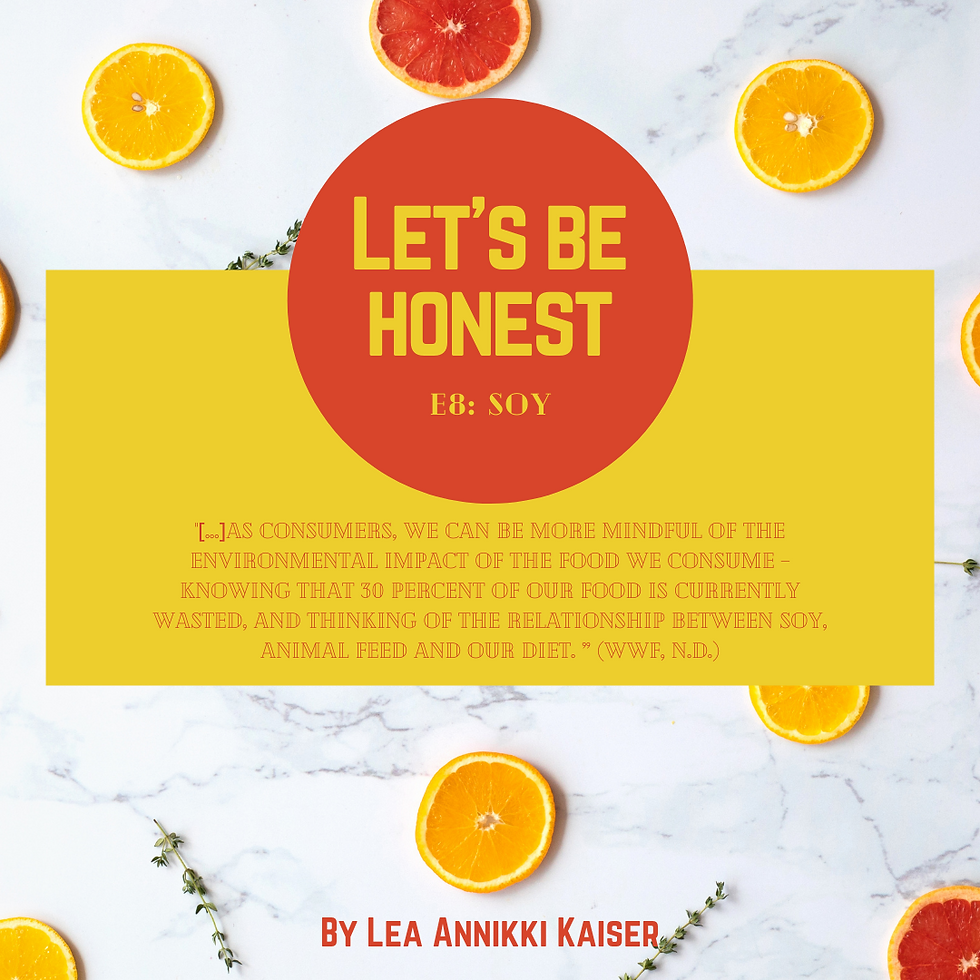Let’s be honest, Episode 8: Soy
- FoodCircle Team

- Feb 23, 2022
- 4 min read
Updated: Feb 28, 2022
Let’s be honest is a Food Circle’s project with the aim to open up the conversation about the challenges when being or becoming a member of the SC (Sustainability Club). This series will shine a light on the different approaches to make life more sustainable, as well as the step-backs and difficulties that arise. Being more kind and understanding, instead of critical, will hopefully help to encourage us to try, instead of giving up when facing a step-back or failure. This is made possible thanks to Sapient, the mother company of Food Circle, which every year offers internships to students from all around the world creating a uniquely multicultural environment.
Let’s celebrate the achievements and give room for honesty and struggles!

Today, let’s be honest about soy. When I started turning vegetarian, I discovered soy products. Soy is one of the key sources of protein and vegetable oil. I love the many variants and options. Tofu is amazing for so many dishes: salad, soup, sushi, pasta, fried with soy sauce- the options are endless. I also tried turning more and more vegan and the first step meant finding alternatives for milk (since I drink a lot of coffee and mostly with milk). When I started turning vegetarian about seven years ago the only alternative for milk offered was often soy milk. I now prefer oat milk but tend to consume soy milk nevertheless when I don’t have other options.
My point is: Soy was and is an important part of my vegetarian life.
Nowadays, there are more and more vegan yogurt alternatives popping up on store shelves. The main ingredient is often (you can guess it): Soy. Meat alternatives, that luckily appear more and more as well, often use soy as their base. I don’t want to get started on the whole: Mah, you are vegetarian and still eat meat alternatives, you are being a hypocrite. First of all: You are entitled to your opinion and you can think that I am being hypocritical. What I don’t appreciate, and mentioned many times already, is the competition we made out of this sustainable change. To perform better in the sustainable race, often not an improvement, but criticism for others is used. ‘ You are not better, because… you eat meat alternatives; you still eat cheese; you sometimes use the plane to travel, etc. We live in a society and world that is mostly ruled by values and systems that don’t prioritize protecting our environment and nature. Instead of trying to criticize, let’s find achievements, changes and values to complement this matter. Let’s celebrate sustainable change instead of demotivating others due to imperfections and room for improvement.
Soy seems to be essential in the wonderful world of someone trying to find vegan or vegetarian alternatives or just enjoys soy products in general.
Pretty much the moment I discovered soy products, I got confronted with the number one argument against vegetarianism and veganism: ‘You are responsible for deforestation and a lot of damage, as well as pain and suffering because you eat soy. For the soy production rainforest is used and you are therefore not any better. Honestly, you are even worse.’
Oh no, I thought. Here I am just trying to avoid eating animals and there I go destroying our planet even more with this lifestyle.
Today, I am here, to be honest about soy. The harm and the production, as well as the vegetarian and vegan role in this.
In the last two decades, soy production has more than doubled. The main buyers and consumers are China, followed by Europe. Soy should be planted in temperate and tropical regions. Therefore, 80% of the generated soy finds its origin in the US, Argentina and Brazil. The main problem for the natural and local environment is the unsustainable conversion of forests, savannas and grassland to farmland. This means endangering wildlife and the ecosystems, as well as regional and traditional communities. The greenhouse gasses generated from deforestation and area conversion increase climate change. Natural ecosystems are often changed with soy production, causing soil erosion and a different hydrological cycle. An increase in resource usage, mainly energy, water, agrochemicals and soil, endanger nature and people.
It is a misconception that alternative soy products for meat and dairy drive deforestation. For 27% of the worldwide vegetable oil production, soy is used. In addition, soy is increasingly used for biodiesel production. However, most of the generated soy is distributed to animals. We consume the most indirectly through meat and dairy. 80% of the soy is distributed to livestock (WWF, n.d.). Only about 7% of soy is used directly for human consumption. The enormous growth in soy demand can be rooted in the demand for vegetable oil, biofuel and animal feed, rather than the growing demand for meat and dairy alternatives
(Ritchie & Roser, 2021).
To conclude, it should now be clear that vegetarians and vegans are not the problem in the soy industry and production, but rather the overconsumption for meat and dairy production. There need to be regulations and safeguards set into place to preserve and protect people and nature:
“Without proper safeguards, the soybean industry is causing widespread deforestation and displacement of small farmers and indigenous peoples around the globe.[...]As consumers, we can be more mindful of the environmental impact of the food we consume – knowing that 30 percent of our food is currently wasted, and thinking of the relationship between soy, animal feed and our diet. ” (WWF, n.d.)
Author and Editor: Lea Annikki Kaiser
References
Ritchie, H., & Roser, M. (2021). Forests and Deforestation. our world in data. https://ourworldindata.org/soy
WWF. (n.d.). Soy. WWF. Retrieved February 23, 2022, from https://wwf.panda.org/discover/our_focus/food_practice/sustainable_production/soy/
WWF. (n.d.). Soy | Industries | WWF. World Wildlife Fund. Retrieved February 23, 2022, from https://www.worldwildlife.org/industries/soy




Comments